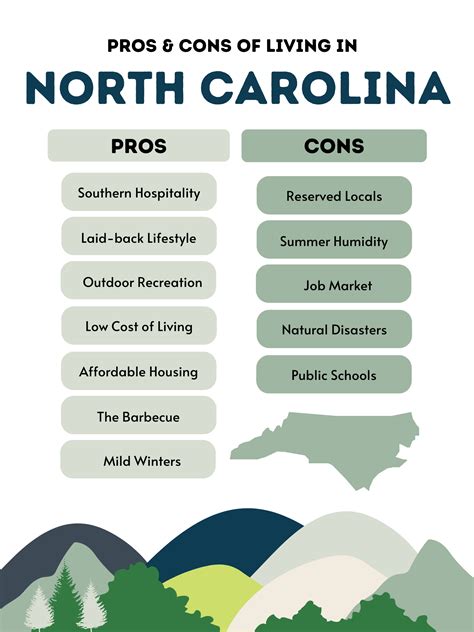North Carolina, known for its picturesque mountains, pristine beaches, and vibrant cities, offers a captivating blend of nature and culture. But before making a life-changing relocation, it’s crucial to weigh the pros and cons carefully. Here’s an extensive analysis to guide your decision-making process.

Pros of Living in North Carolina
1. Natural Beauty and Outdoor Recreation:
North Carolina boasts an unparalleled natural landscape, ranging from the breathtaking Blue Ridge Mountains to the stunning Outer Banks beaches. With over 100 state parks and recreation areas, hiking, fishing, camping, and kayaking are popular outdoor activities that immerse residents in the state’s scenic beauty.
2. Low Cost of Living:
Compared to many other states, North Carolina offers a relatively low cost of living. Housing costs are affordable, with the median home price falling below the national average. Utilities, groceries, and transportation expenses are also comparatively lower, making it an attractive option for individuals and families seeking financial flexibility.
3. Growing Economy:
North Carolina has experienced significant economic growth in recent years, particularly in the healthcare, manufacturing, and technology sectors. Major companies like Bank of America, Lowe’s, and Cisco Systems have headquarters or major operations in the state, providing ample employment opportunities and economic stability.
4. Diverse Culture and Arts Scene:
North Carolina is a melting pot of different cultures and boasts a thriving arts scene. Asheville, known as the “Paris of the South,” offers a vibrant artistic community with numerous galleries, studios, and performance venues. Charlotte, the state’s largest city, hosts a renowned symphony orchestra, opera company, and performing arts center.
5. Educational Opportunities:
The state houses several prestigious universities, including the University of North Carolina at Chapel Hill, Duke University, and North Carolina State University. These institutions provide access to renowned faculty, cutting-edge research facilities, and a wide range of academic programs.
Cons of Living in North Carolina
1. High Humidity and Heat:
North Carolina’s climate can be challenging during the summer months, with high humidity and temperatures reaching into the 90s. The heat can be especially uncomfortable in urban areas, where it’s intensified by the concrete jungle.
2. Natural Disasters:
Like many coastal states, North Carolina is susceptible to hurricanes and other severe weather events. Hurricanes can bring strong winds, flooding, and power outages, which can disrupt daily life and cause property damage.
3. Traffic Congestion:
Major cities like Charlotte, Raleigh, and Greensboro experience significant traffic congestion during peak hours. The lack of robust public transportation options can exacerbate the problem, especially during rush hour.
4. Limited Job Opportunities in Rural Areas:
While the economy is strong in urban centers, job opportunities can be scarce in rural parts of the state. Residents of these areas may have to commute long distances to find suitable employment.
5. Political Landscape:
North Carolina’s political landscape is often polarized, with strong partisan divisions. This can sometimes lead to gridlock in state government and impact public policies.
Decision Factors to Consider
Deciding whether North Carolina is the right fit for you depends on your individual priorities and circumstances:
- Nature Lovers: If you appreciate natural beauty and enjoy outdoor recreation, North Carolina’s abundant parks and open spaces will undoubtedly appeal to you.
- Budget-Conscious Individuals: Those seeking a lower cost of living will find North Carolina an attractive option, particularly for housing and daily expenses.
- Career-Oriented Professionals: The state’s growing economy and presence of major companies provide ample career opportunities, especially in healthcare, manufacturing, and technology.
- Arts and Culture Enthusiasts: Asheville, Charlotte, and other cities in North Carolina offer a vibrant arts scene, with museums, galleries, and performing arts venues catering to a variety of tastes.
- Hurricane Preparedness: Residents should be aware of North Carolina’s susceptibility to hurricanes and take appropriate precautions to mitigate potential risks.
How to Make a Decision
To make a well-informed decision, consider the following steps:
- Research: Explore North Carolina’s different regions, cities, and job markets to identify areas that align with your interests and needs.
- Visit: Plan a visit to the state to experience firsthand the natural beauty, culture, and cost of living.
- Talk to Locals: Connect with residents to gain insights into their experiences living in North Carolina and gather valuable local knowledge.
- Consider Your Priorities: Determine which factors are most important to you and weigh them against the pros and cons of living in the state.
Frequently Asked Questions (FAQs)
1. What is the cost of living in North Carolina?
According to the Council for Community and Economic Research, the cost of living in North Carolina is about 10% lower than the national average.
2. What are the major industries in North Carolina?
Healthcare, manufacturing, and technology are the largest industries in North Carolina.
3. Is North Carolina a good place for retirees?
Yes, North Carolina is a popular destination for retirees. It offers a low cost of living, mild winters, and access to excellent healthcare facilities.
4. What is the weather like in North Carolina?
North Carolina experiences four distinct seasons. Summers are hot and humid, with temperatures reaching into the 90s. Winters are generally mild, with occasional snowfall in the mountains.
5. Is North Carolina a safe place to live?
Overall, North Carolina is a relatively safe state. However, like any other area, it’s important to be aware of your surroundings and take necessary precautions to protect yourself from crime.
6. What is the healthcare system like in North Carolina?
North Carolina has a strong healthcare system, with world-renowned hospitals and medical centers located throughout the state.
